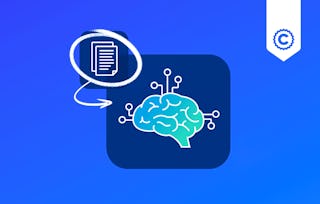The course extends the fundamental tools in "Machine Learning Foundations" to powerful and practical models by three directions, which includes embedding numerous features, combining predictive features, and distilling hidden features. [這門課將先前「機器學習基石」課程中所學的基礎工具往三個方向延伸為強大而實用的工具。這三個方向包括嵌入大量的特徵、融合預測性的特徵、與萃取潛藏的特徵。]

機器學習技法 (Machine Learning Techniques)

35 reviews
Skills you'll gain
- Deep Learning
- Decision Tree Learning
- Machine Learning
- Model Evaluation
- Machine Learning Algorithms
- Classification Algorithms
- Statistical Machine Learning
- Feature Engineering
- Embeddings
- Regression Analysis
- Supervised Learning
- Transfer Learning
- Artificial Neural Networks
- Random Forest Algorithm
- Logistic Regression
- Dimensionality Reduction
- Skills section collapsed. Showing 9 of 16 skills.
Details to know

Add to your LinkedIn profile
4 assignments
See how employees at top companies are mastering in-demand skills

There are 16 modules in this course
more robust linear classification solvable with quadratic programming
What's included
5 videos4 readings
another QP form of SVM with valuable geometric messages and almost no dependence on the dimension of transformation
What's included
4 videos
kernel as a shortcut to (transform + inner product): allowing a spectrum of models ranging from simple linear ones to infinite dimensional ones with margin control
What's included
4 videos
a new primal formulation that allows some penalized margin violations, which is equivalent to a dual formulation with upper-bounded variables
What's included
4 videos1 assignment
soft-classification by an SVM-like sparse model using two-level learning, or by a "kernelized" logistic regression model using representer theorem
What's included
4 videos
kernel ridge regression via ridge regression + representer theorem, or support vector regression via regularized tube error + Lagrange dual
What's included
4 videos
blending known diverse hypotheses uniformly, linearly, or even non-linearly; obtaining diverse hypotheses from bootstrapped data
What's included
4 videos
"optimal" re-weighting for diverse hypotheses and adaptive linear aggregation to boost weak algorithms
What's included
4 videos1 assignment
recursive branching (purification) for conditional aggregation of simple hypotheses
What's included
4 videos
bootstrap aggregation of randomized decision trees with automatic validation
What's included
4 videos
aggregating trees from functional + steepest gradient descent subject to any error measure
What's included
4 videos
automatic feature extraction from layers of neurons with the back-propagation technique for stochastic gradient descent
What's included
4 videos1 assignment
an early and simple deep learning model that pre-trains with denoising autoencoder and fine-tunes with back-propagation
What's included
4 videos
linear aggregation of distance-based similarities to prototypes found by clustering
What's included
4 videos
linear models of items on extracted user features (or vice versa) jointly optimized with stochastic gradient descent for recommender systems
What's included
4 videos
summary from the angles of feature exploitation, error optimization, and overfitting elimination towards practical use cases of machine learning
What's included
4 videos1 assignment
Instructor

Offered by
Explore more from Machine Learning
 Status: Free Trial
Status: Free TrialJohns Hopkins University
 Status: Free Trial
Status: Free TrialFractal Analytics
 Status: Free Trial
Status: Free TrialFractal Analytics
 Status: Free Trial
Status: Free TrialCoursera
Why people choose Coursera for their career

Felipe M.

Jennifer J.

Larry W.

Chaitanya A.

Open new doors with Coursera Plus
Unlimited access to 10,000+ world-class courses, hands-on projects, and job-ready certificate programs - all included in your subscription
Advance your career with an online degree
Earn a degree from world-class universities - 100% online
Join over 3,400 global companies that choose Coursera for Business
Upskill your employees to excel in the digital economy
Frequently asked questions
To access the course materials, assignments and to earn a Certificate, you will need to purchase the Certificate experience when you enroll in a course. You can try a Free Trial instead, or apply for Financial Aid. The course may offer 'Full Course, No Certificate' instead. This option lets you see all course materials, submit required assessments, and get a final grade. This also means that you will not be able to purchase a Certificate experience.
When you purchase a Certificate you get access to all course materials, including graded assignments. Upon completing the course, your electronic Certificate will be added to your Accomplishments page - from there, you can print your Certificate or add it to your LinkedIn profile.
Yes. In select learning programs, you can apply for financial aid or a scholarship if you can’t afford the enrollment fee. If fin aid or scholarship is available for your learning program selection, you’ll find a link to apply on the description page.
More questions
Financial aid available,

